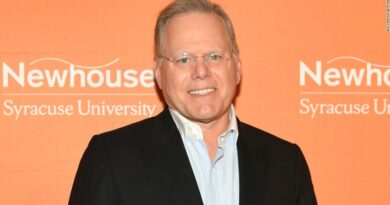Inside Trump’s Club When the Call Came: You’re Indicted
Former President Donald J. Trump was gathered with his core political advisers in the office near his poolside cottage at his club in Bedminster, N.J., when his phone rang around 7 p.m. on Thursday. On the line, according to two people with knowledge of the call, was one of his lawyers, informing him he had been indicted for the second time in less than three months.
Unlike the first indictment — in a state court in Manhattan related to allegations he had paid hush money to a porn star during the 2016 election — the current charges were federal, and stemmed from his conduct just before leaving office and for roughly 18 months after.
Mr. Trump, always compartmentalizing, immediately moved to a political reaction.
At 7:21 p.m., he did what he used to do so often when he was president: He personally programmed the chyrons on every news channel in the country. He broke the news of his own indictment — drafting and then sending a three-part statement on his social media network, Truth Social, that soon interrupted the nighttime shows on Fox News, MSNBC and CNN.
The former president posted a screed against the Biden administration, but buried within his attacks on Democrats were pertinent details: not only that he had been indicted, but also that he had been summoned to appear at a Miami courthouse on Tuesday afternoon.
A studio van was brought to Bedminster so one of his lawyers could go on television. Another Trump lawyer, James Trusty, soon went on CNN to describe a few of the charges, and recounted his client’s reaction.
“He thought about it,” Mr. Trusty said. “He said: ‘This is just a sad day. I can’t believe I have been indicted.’” Mr. Trusty went on: “Those are kind of my — my summary words of what he had to say. But, at the same time, he immediately recognizes the historic nature of this. This is crossing the Rubicon.”
For days, Mr. Trump’s team had been casting about for information about his indictment, after three of his lawyers met with Justice Department officials on Monday. They entered that meeting having been told charges were likely, and nothing that was said changed that perspective, according to people close to Mr. Trump. But while they suspected an indictment was imminent, they were operating more off rumor, gossip and news reports than from verified facts.
As speculation intensified ahead of the Justice Department’s notification of the indictment, Mr. Trump’s team pretaped a video of the former president reacting to the expected charges in a speech direct to the camera — and standing in front of what appeared to be a version of a painting of President Theodore Roosevelt and Kaiser Wilhelm II, Germany’s leader during World War I.
Half an hour after he announced his indictment, he posted the video on his social media website. In it, he bashes Democrats, portrays the indictment as evidence of “a nation in decline” and calls himself “an innocent man.”
Mr. Trump’s team had urged Republicans close to him to start issuing statements, and soon his allies obliged: Representative Jim Jordan of Ohio, the chairman of the House Judiciary Committee, said in a tweet, “Sad day for America. God Bless President Trump.”
Speaker Kevin McCarthy went further, calling it a “dark day” and vowing, “House Republicans will hold this brazen weaponization of power accountable.”
That Mr. Trump was surrounded at Bedminster by his political and communications circle, and not by most of his lawyers, reflected both the uncertainty of when charges might come and how Mr. Trump has consistently approached his legal challenges.
His political advisers had been preparing for weeks to exploit the federal indictment for full effect. His team has come to view federal law enforcement actions against him as a core part of its fund-raising strategy. Online fund-raising — which has long been the lifeblood of Mr. Trump’s political operation because high-end Republican donors largely shun him — has dried up for all Republican candidates over the past several years, including Mr. Trump.
G.O.P. donors are exhausted by constant hysterical appeals to give money to Mr. Trump to stop Democrats from destroying the nation. It takes a lot these days to grab the attention of such contributors; indictments are among the few events that enliven the grass roots enough to dip into their pockets.
The last time Mr. Trump was charged, in New York, his campaign said it had raised more than $12 million in the week after the indictment — a huge bump in his previously anemic fund-raising. Since then, Mr. Trump’s fund-raising has fallen back to a disappointing level, according to people briefed on the situation.
Not even an hour had passed since Mr. Trump learned of his indictment before his campaign had sent its first mass email to monetize the sense of shared persecution and victimhood that the former president has fostered among his supporters. The Trump fund-raising appeal around 7:45 p.m. on Thursday began, “We are watching our Republic DIE before our very eyes.”
Mr. Trump’s allies outside his official campaign structure have also prepared to milk this moment, and to push his political antibodies into effect.
Officials at the main pro-Trump super PAC, MAGA Inc., have been feeding allies opposition research so they have talking points to attack Jack Smith, the special counsel who brought the case against Mr. Trump, in television and radio appearances and on social media. The group has even distributed information about Mr. Smith’s wife to try to suggest that her donations to Democratic politicians have created a conflict of interest for her husband.
Last week, as the former president’s allies saw reports that Mr. Smith was most likely nearing the end of his investigation, strategists working with Mr. Trump’s super PAC began drafting a television advertisement to coincide with the anticipated federal indictment.
The commercial will be submitted for national cable placement on Friday, according to a person with direct knowledge of the plans. The advertisement’s messages will tie in with talking points that are circulating among some of Mr. Trump’s most ardent defenders on Capitol Hill. They will portray the indictment as a partisan plot from President Biden’s Justice Department.
These allies also plan to insinuate — with no evidence — that the Justice Department has timed this indictment to distract from House Republicans’ investigations into Mr. Biden and his family’s business affairs.
As Mr. Trump prepares for his arraignment on Tuesday afternoon at the federal courthouse in Miami, some of his close allies are preparing a campaign to pressure his competitors in the Republican presidential nominating contest to rally around him.
“Every ‘Republican’ running for President should suspend their campaign and go to Miami as a show of support,” tweeted Charlie Kirk, a young conservative activist who is close to Mr. Trump.
“If you don’t,” Mr. Kirk added, “you are part of the problem. Either we have an opposition party or we don’t.”
Operatives from several rival campaigns had privately conceded that they were dreading the indictment because it would take over the news cycle and deprive their candidates of media attention.
A senior adviser to one of Mr. Trump’s competitors in the Republican primary, who spoke on the condition of anonymity, said that G.O.P. voters overwhelmingly believed that any charge against Mr. Trump was a plot by Democrats and that they wanted to see all Republicans fight to defend the former president.
This leaves most Republicans running in 2024 in the abject position of feeling as if the only way they can appease their voters is to full-throatedly defend Mr. Trump and pause efforts to contrast their records against his.
Mr. Trump’s team ran the same pressure campaign the last time he was indicted, in New York — and it worked to great effect.
In mid-March, the former president predicted that his arrest was imminent, and his political operation and allies in the news media began publicly bullying Gov. Ron DeSantis of Florida to run to Mr. Trump’s defense, which he ultimately did.
This time, Mr. DeSantis attacked the prosecutors, but also did not defend Mr. Trump. Without promising to pardon Mr. Trump, as another candidate, Vivek Ramaswamy, did, Mr. DeSantis declared on Twitter, “The DeSantis administration will bring accountability to the DOJ, excise political bias and end weaponization once and for all.”
There were other, more eccentric parallels on Thursday night to Mr. Trump’s first indictment.
Roughly 90 minutes after he found out about his latest travails, Mr. Trump — who was playing disc jockey on his club patio at Mar-a-Lago after his April arraignment — went to the main building at Bedminster for dinner outdoors.
Wearing a red Make America Great Again cap, he again acted as a D.J., according to a person there, using an iPad to play some of his favorites: Elvis, the opera singer Pavarotti and his idol in showmanship, James Brown.
Maggie Haberman is a senior political correspondent and the author of “Confidence Man: The Making of Donald Trump and the Breaking of America.” She was part of a team that won a Pulitzer Prize in 2018 for reporting on President Trump’s advisers and their connections to Russia. @maggieNYT
Jonathan Swan is a political reporter who focuses on campaigns and Congress. As a reporter for Axios, he won an Emmy Award for his 2020 interview of then-President Donald J. Trump, and the White House Correspondents’ Association’s Aldo Beckman Award for “overall excellence in White House coverage” in 2022. @jonathanvswan
Source: Read Full Article


